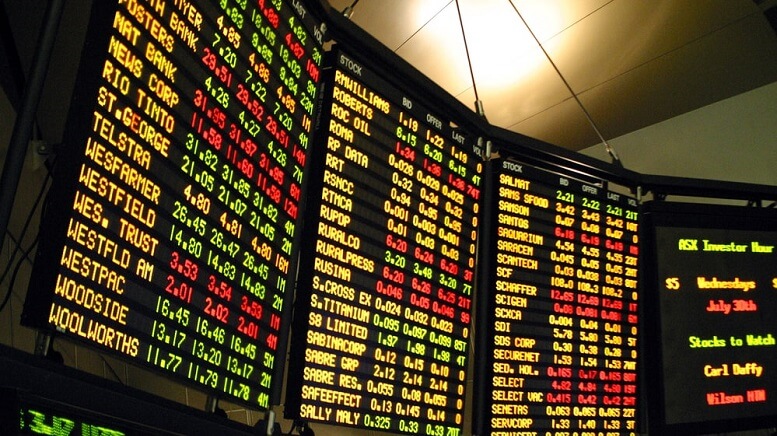The ongoing stock market decline worsened on Friday as companies across multiple industries suffered heavy losses. Escalating trade tensions between the United States and China have rattled investors, leading to widespread sell-offs in sectors such as technology, banking, aerospace, and airlines.
The stock market downturn follows the U.S. administration’s decision to impose 34% tariffs on Chinese imports, prompting Beijing to respond with matching tariffs on all U.S. products. As a result, stocks plummeted, with major indexes down between 3.5% and 4.5% in morning trading.
JPMorgan Chase (NYSE:JPM) increased its recession risk forecast to 60%, up from 40%, citing weakening consumer spending and rising business costs due to tariffs.
Tech Stocks Lead the Decline
Technology companies bore the brunt of the stock market decline, with major players seeing double-digit losses over two days. Since many of these firms rely on global supply chains, higher tariffs threaten their profitability.
- Apple (NASDAQ:AAPL): Down 3.2% Friday, following a 9.3% drop Thursday.
- Nvidia (NASDAQ:NVDA): Declined 5.3% Friday after falling 7.8% the previous day.
- HP (NYSE:HPQ): Lost 4.3% Friday after a sharp 14.7% drop Thursday.
- Dell (NYSE:DELL): Down 4.9% Friday, adding to Thursday’s 19% decline.
If tariffs persist, production costs will rise, potentially leading to higher consumer prices and lower demand for electronics.
Airlines Struggle as Consumers Cut Back
The airline industry, already battling rising fuel costs, saw stocks tumble as recession fears grew. If consumer spending slows due to inflation and job uncertainty, discretionary travel could take a significant hit.
- United Airlines (NASDAQ:UAL): Plunged 10.4% Friday, following a 15.6% drop Thursday.
- American Airlines (NASDAQ:AAL): Down 8.3% Friday after a 10.3% decline Thursday.
- Delta Air Lines (NYSE:DAL): Fell 7.3% Friday, following a 10.7% loss Thursday.
Banking Sector Faces Recession Fears
A slowing economy would weaken loan demand and increase the risk of defaults, causing bank stocks to suffer. Financial institutions took another hit Friday after already steep losses Thursday.
- Wells Fargo (NYSE:WFC): Dropped 6% Friday after a 9.1% decline Thursday.
- Bank of America (NYSE:BAC): Down 6.7% Friday, adding to an 11.1% loss Thursday.
- JPMorgan Chase (NYSE:JPM): Fell 6.2% Friday after a 7% drop Thursday.
Industrial and Aerospace Stocks Suffer
With China imposing additional export controls on rare earth materials, the aerospace and heavy equipment industries felt the pressure.
- Boeing (NYSE:BA): Declined 8% Friday after a 10.5% drop Thursday.
- Caterpillar (NYSE:CAT): Lost 5.2% Friday, adding to an 8.6% decline Thursday.
- Archer-Daniels-Midland (NYSE:ADM): Fell 7.1% Friday after slipping 0.8% Thursday.
Automakers Hold Up Better Than Expected
Despite the stock market wide losses, automakers showed some resilience. Companies like Ford (NYSE:F) even posted slight gains as investors weighed their reliance on domestic production over imported materials.
- General Motors (NYSE:GM): Down 3.2% Friday after a 4.3% loss Thursday.
- Ford (NYSE:F): Rose 0.5% Friday after dropping 6% Thursday.
- Tesla (NASDAQ:TSLA): Fell 7.7% Friday following a 5.5% drop Thursday.
Outlook: More Volatility Ahead?
The stock market decline has erased trillions in value, and with no resolution to the trade war in sight, volatility is expected to continue. Analysts warn that further losses could trigger a broader sell-off, especially if consumer confidence declines. Investors will be closely watching economic data and corporate earnings in the coming weeks for signs of stability—or further trouble ahead.
In addition to trade tensions, concerns over inflation and interest rate policies add to market uncertainty. If the Federal Reserve tightens monetary policy further, borrowing costs could rise, squeezing both businesses and consumers. For now, caution remains the dominant sentiment, with investors seeking safe-haven assets like gold and bonds.
Featured Image – Depositphotos








